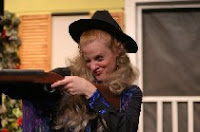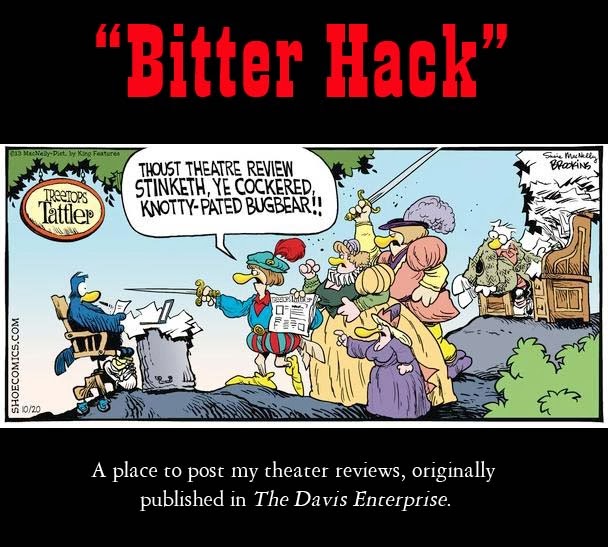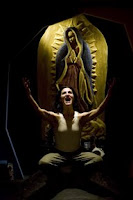It’s always nice to feel you have the inside track on something very special that the rest of the world hasn’t discovered yet.
That’s how I felt when I went to see “Jacob Marley’s Christmas Carol” at Capital Stage, on the Riverboat Delta King in Old Sacramento in December of 2005. Of all the shows I’d reviewed that year, this was my favorite. The production was so good that I continued to attend the shows through the 2006-2007 season and with each show, I came away with a real appreciation for the quality of the productions and the realization that there is more to quality than a fancy venue and a big budget.
I recently had the opportunity to speak with managing director and sometime actor Peter Mohrmann and with Megan Smith, who is starring in the 3-person play, “Three Days of Rain,” directed by Mohrmann, and set to open on April 13.
Both are Davis natives who left Davis, received their degrees in theater and then discovered that to find their heart’s desire (employment in theater), they didn’t really need to look farther than their own front yards. Both credit their successes to the good start they received at Davis High School.
“Dave Burmester and his Improv group had a major influence on my life,” says Mohrmann, who graduated from Davis High School in the mid 1970s. “That experience has stayed with me through all my years. The training that we did, being in the moment, thinking ‘right now’ has never left me as a performer. I worked with an amazing group of people that I learned from and played with at that time.”
“Peter was one of my favorite people,” commented Burmester. “As a freshman at UCD, he was my assistant director on the only Davis Senior High School show I ever did -- A Thurber Carnival -- which led directly to the founding of Acme. He was also a stalwart in Improv! while at DSHS.”
“Acme Theater was a big deal for me,” added Smith, who graduated in 1994, and who credits her role in an Acme production of “A Shayna Maidel” with setting her plans for a career in theater into motion. “Dave was a fantastic director. That was the moment when I definitely committed to being in theater for as long as I possibly could.”
She also joined the Madrigal Choir, under Karen Gardias. “Karen was quite a mentor, especially in my senior year,” she says, adding that Gardias has remained a good friend and great supporter.
While Smith was still in grammar and high school, Mohrmann was already learning the ins and outs of theater. He attended San Francisco State, but then returned to Davis to get his Bachelor’s Degree at UCD (“I just have Davis in my blood.”). He did all the things that aspiring actors do. He worked as a waiter at Brewster House and worked for a time at Davis Lumber (“I think everybody has to work here at some point, if you live here long enough.”)
Eventually he took an office job at UCD and realized he had a knack for administrative work, even then.
After a 3-year stint in Chicago, where he received his Master of Fine Arts Degree from DePaul University, he moved back to Davis to care for his ailing mother. “I thought that I’d get my Equity card quickly in Sacramento and then move on,” he laughs.
To support himself while he was working on getting his equity card, he took a temp job, which landed him in Sacramento Medical Center’s nursing administration department, which turned into a full time job as office manager. (“Office work tends to work well with theater when you are just starting out,” he notes.)
Eleven years later he was still working for Sutter and occasionally performing with theaters like The Show Below, Garbeau’s Dinner Theater in Rancho Cordova, Foothill Theater Company in Nevada City, and the Tahoe Shakespeare Festival. Then a bit of synergy changed the direction of Mohrmann’s life.
Along with a group of other artists, Mohrmann founded Synergy Stage, which performed several shows on the riverboat Delta King. One of the founders of the group was actress Stephanie Gularte, who eventually started the Delta King Theater and asked Mohrmann if he was interested in becoming managing director.
“I loved Sutter, but I’d been there eleven years – how did that happen?” He met with Gularte, “and all of a sudden I’m managing director.” It brought all of his training in theater and work in administration full circle.
Gularte was in the process of separating from the Delta King and forming a separate theater company, which would continue to perform on the river boat, but which would be it’s own entity. It was purely a financial decision. As the performing wing of the Delta King, the group had to be considered a for-profit theater group, which put limits on funding resources. As a separate theater group, they could be a non-profit organization and raise money through sponsorships and individual donations, something which was crucial to establish the kind of quality theater Gularte and Mohrmann wanted to create.
“Theater is not cheap. Art is not cheap,” said Mohrmann, wryly.
The biggest challenge for any theater company is always the money — continuously asking for donations, constantly trying to figure out ways to stretch the dollar. “People don’t realize that the ticket price is only 50-60% of what it costs to put on a show,” Mohrmann explained.
You start with the royalties (the money paid for the rights to perform a show) and add “all those things that could turn you into a republican -- workers comp, health insurance. I am proud that we are a company that pays union actors and pays non-union actors as well.”
The group negotiates with Equity and agrees to hire a certain number (usually 2-4) union actors , plus a union Stage Manager. Then there are designers to hire as well, which is not always an easy task. “Our space has some real specific limitations to it so it’s a challenge, but it can be interesting,” said Mohrmann, pointing out the low ceiling which adds to the intimate feeling for the audience, but can be a problem for designers.
Capital Stage works closely with the community colleges and with UC Davis and offers a strong opportunity for actors and designers to work together.
“Part of the mission of Capital Stage is to play an integral role in creating more opportunities for actors, directors, writers and designers so that our talented artists will stay here in our community,” says Gularte.
“I love working with Capital Stage,” says Smith, who has returned to Davis from San Francisco, where she now lives and performs, to work with the company. “I can’t stay too many positive things about how professional this company is and what an absolute delight it is to work with them.” She feels the intimacy of the small theater is “one of its calling cards.”
Smith points out that when she was growing up, the opportunities for professional actors in the Sacramento area were not as plentiful as they are now, especially for straight plays. “Sacramento Theater Company, B Street Theater and Capital Stage all complement each other. They offer wildly different options for people to see different sorts of theater.”
“We’re not here to copy STC or B Street,” explains Mohrmann. He adds that Capital Stage wants to do things that have not been done in this area, critically acclaimed pieces, not just award winners. “We want to make you think,” he says. “We’re not here to advocate a certain way of thinking but we’re here to illuminate other ways of thinking. We’re not here to say ‘this is how you lead your life,’ but to explore how others are leading their lives to help you understand their viewpoint.”
Smith feels that the current production, “Three Days of Rain” fits the bill perfectly. “When I first read it, I loved the quality of discovery about it, how all the characters in the first act are searching for the truth and they think they’ve found the truth about their parents. The challenge of the second act is to really tell the story in the moment so that the audience discovers those epiphanies with us.”
“Any play where you see people you relate to on stage making discoveries about themselves, is the kind of theater I’m interested in” she added. “It’s the kind of theater that makes people get in their cars and talk about it all the way home.”
I attended two rehearsals for “Three Days of Rain” and enjoyed watching the collaborative process between director Mohrmann and his actors. “Peter has a great sense of fun and discovery. Capitol Stage is choosing people who have the same artistic value that they do and can bring something new and fresh to what they’re trying to do.”
News of the existence of Capital Stage is slowly getting out to theater-goers in the Sacramento area. “It takes awhile for people to realize we are there,” says Mohrmann. “As we go out to make calls and ask for individual donations and for corporate sponsorships, people still ask ‘who is Capital Stage’? We’re the new kids on the block and it takes awhile.”
It would seem that the group has all it needs to make a success of things. An intimate venue in Old Sacramento, where parking is plentiful (the parking lot is only a block away), and there are lots of places for a pre-show dinner or an after-show drink. The group presents quality professional productions, and has experienced management and support staff.
We have consistently provided a quality product with our limited resources and the limitations that the theater physically holds for, but on the other hand we are continually growing. Our audience members believe that you make it good and they will come. Our subscribers are our biggest word of mouth,” concludes Mohrmann.
 Because the writers of a musical create encore numbers, to be performed when the number itself gets lots of applause and the audience obviously wants more, this does not mean that those encore numbers should be performed routinely as part of the show.
Because the writers of a musical create encore numbers, to be performed when the number itself gets lots of applause and the audience obviously wants more, this does not mean that those encore numbers should be performed routinely as part of the show.

